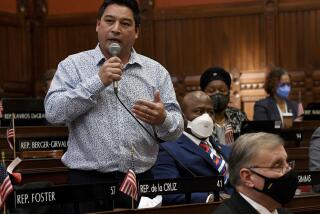Ethical Jam
- Share via
Is $300 million too much to pay for an uncorrupted Congress? That’s the bottom-line question raised by the recommendation of the Commission on Executive, Legislative and Judicial Salaries for a 50% pay raise for Congress members, federal judges and top Administration officials. In exchange for having their salaries raised to $135,000, legislators would have to renounce the honorariums that many get from special-interest groups for making speeches, visiting factories or just showing up for breakfast. Taxpayers may gasp at the ideaof a $45,000 pay raise--twice what the average American earns in a year--but if this proposal weans Congress from honorariums, an institutionalized form of influence buying, it’s a bargain.
Congress got itself into this ethical jam by declining, over the years, to approve regular raises for its own members as well as the judges, Cabinet members and top civil servants whose salaries are tied to congressional pay levels; lawmakers were unwilling to take the political heat. The result is that the buying power of top federal salaries has declined by about 35% since 1969. And lawmakers struggling to pay for two residences, one in expensive Washington and the other at home, have become vulnerable to lobbyists’ blandishments. Taking an honorarium from a special-interest group with a bill pending before Congress may not be quite as blatant as taking a bribe, but there is still an unspoken quid pro quo ; honorariums would not be so generous unless a payoff, in the form of legislative favors, was expected.
The next step is up to President Reagan. Although sympathetic to legislators’ financial woes and concerned about the difficulty of recruiting top talent for the executive branch, he might scale down the proposed raises when he sends the commission’s recommendations to Capitol Hill. A 35% increase would be enough to compensate for the erosion of buying power that top officials have experienced, and it would be more in keeping with the deficit-cutting spirit of the times and with the constraints of Gramm-Rudman.
Once Reagan acts, Congress can have its raise by doing nothing; the increases would go into effect after 30 days unless disapproved by both houses. But banning honorariums would requirea separate bill and positive action by Congress, which makes some critics regard the raise-for-honorarium trade-off as a shaky bargain. No one, not even the congressional leaders who back this plan, can guarantee that Congress will enact an air-tight bill to outlaw, in the words of formerSen. Thomas Eagleton (D-Mo.), “all forms of honoraria conceivable to man.” But, if Congressis to uphold its end of the bargain, it must close every loophole--no more free air travel, no more trips on corporate jets, no more free lunches.
More to Read
Get the L.A. Times Politics newsletter
Deeply reported insights into legislation, politics and policy from Sacramento, Washington and beyond. In your inbox twice per week.
You may occasionally receive promotional content from the Los Angeles Times.










